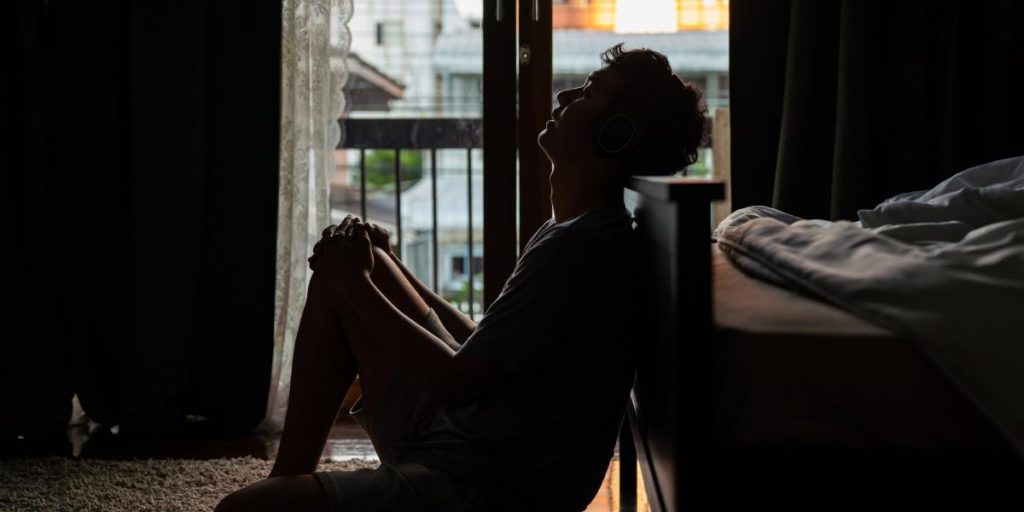How to Cope With the Stigma of Addiction
Understanding the Stigma of Mental Disorders and Substance Abuse

Coping with the stigma of addiction and mental illness can be as exhausting and challenging to live with as the disorders themselves.
Stigma is more than just passing judgment; it is dangerous and seeps into how friends, family, employers, and healthcare professionals interact and treat people with addiction issues.
The worst part of stigma is that it comes from outsiders and is often internalized, leading to shame and embarrassment and a reluctance to reach out for help or seek treatment.
Recognizing, understanding, and challenging stigmas around mental health and substance use disorders can be life-saving and the key to coping with the stigma of addiction and mental disorders.
Addiction can happen to anyone, regardless of age, genetics, or social status.
Stigma Meaning
Stigma is a set of negative and often unfair beliefs, attitudes, and behaviors that society or people have about conditions and circumstances like mental illness, poverty, or addiction.
Stigma often comes from a lack of understanding, ignorance, and inaccurate information picked up from the media and social circles.
In the United States, the most common stigma surrounds people who use drugs and alcohol.
Language and Stigma
When you talk about substance abuse and addiction, stigma language becomes obvious. Words matter, and changing how we talk about struggles with addiction can help remove the stigma.
Separating people from their conditions centers on their humanness— they are a person with a problem, they as a person, are not the problem.
The National Institute on Drug Abuse (NIDA) shows that using person-first language can help reframe the conversations and attitudes surrounding addictive behaviors.
Examples of person-first language include:
- Instead of saying “addict,” say “person with a substance use disorder.”
- Instead of saying “alcoholic,” say “person with an alcohol use disorder.”
- Instead of saying “junkie” or similar terms, say “this person is still using.”
- Instead of saying “drunk,” “alcoholic,” or similar terms, say “they misuse alcohol in dangerous ways.”
Even some of the language surrounding people who are working to overcome their addiction can be problematic. Examples of changing that language include the following:
- Instead of saying “dry drunk” or “former addict,” say “person in recovery.”
- Instead of saying “clean,” say “free of substances.”
- Instead of saying “drying out,” or “getting clean,” say “recovering their health,” or “going through detox.”
Recognizing and correcting stigmatizing language in everyday conversation can go a long way to reducing the stigma and gradually increase understanding and compassion.

Stigma and Addiction
Stigma can be deadly for people with addiction and mental health issues.
The history of addiction stigma in the United States is deeply tied to religious and social movements.
Many people view addiction and mental health struggles as a moral failing, a character flaw, or punishment of some kind; and treat those suffering as dangerous, criminal, and unstable.
The Centers for Disease Control and Prevention (CDC) reports that one in 14 Americans struggle with substance use disorders.
Where society has come to terms and accepted many once-taboo things, the outdated beliefs about addiction continue to be pervasive and harmful.
The people struggling with these health conditions often internalize these attitudes and feel shame and embarrassment for their situations.
Stigma affects and negatively impacts self-image, leading people to isolate themselves and hide their conditions from their loved ones.
The stigma also prevents them from reaching out for help because they feel they don’t deserve help or that help will be denied because of their substance abuse.
People also believe that if they get help and relapse, it will erase all their progress and prove everyone else “right.”
It becomes a vicious cycle that professionals call the “why try” effect.
Doctors and nurses have admitted that they often view people with a history of addiction with low regard and distrust them, afraid they are looking for medication or could be dangerous.
Patients are often not informed of their treatment options or educated about harm reduction strategies, health services, or treatment programs available to them.
The criminal justice system in the United States is also deeply affected by addiction stigma. Almost half the incarcerated population has a substance use disorder, and many are serving sentences for activities directly related to their substance use.
Many inmates with untreated opioid use disorder will return to using almost immediately after their release and often overdose because of reduced tolerance and lack of understanding of their condition.
On top of the stigma of addiction, the stigma of incarceration makes re-entering everyday life and maintaining recovery incredibly difficult.
Many people will relapse and become stuck in a vicious cycle of drug use and jail time.
The stigma of addiction is everywhere, and people trying to overcome it are incredibly aware of how it affects every part of their lives.
Types of Stigmas
Stigmas come from misunderstandings, misinformation, and fear and affect all parts of life. Types of stigma fall into three recognized categories including:
Structural and Institutional stigma
Structural and institutional stigma involves laws and policies of public and private companies, including the government, the criminal justice system, education institutes, employers, insurance companies, healthcare and treatment centers, housing agencies, and research agencies.
Because of this, stigmatized people can lose opportunities and are excluded from receiving care and funding that benefits other people.
Public and Social Stigma
The public and social stigma definition includes the general population’s attitude toward people with addiction and how they interact and treat them. Media and social circles can reinforce this stigma.
Because of this, interactions with law enforcement, first responders, judges, employers, and even friends and family members can be damaging and isolating.
Self-Stigma
Self-stigma happens when a person has encountered external stigmas, internalizes the shame, and believes they deserve to be mistreated and suffer because of their conditions.
Because of this, many people will isolate themselves, hide their disorder and symptoms, avoid seeking treatment, and self-medicate to stop their internal thoughts and feelings.
Friends and families of people struggling with mental health and addiction are impacted by stigmas too.

Break the Stigma of Mental Health
The best way to break a stigma is to talk about it openly and honestly.
Research has shown that interacting with a stigmatized group of people is the most effective way to break down barriers and preconceived notions.
Public conversations about struggling with mental health and addiction also give courage to those suffering in silence and show them that they are not alone.
Mental Health Stigma Quotes
Mental health and addiction are intertwined, and facing stigma will increase the self-stigma around the other.
Author Jenny Lawson once said:
“When you come out of the grips of a depression, there is an incredible relief, but not one you feel allowed to celebrate. Instead, the feeling of victory is replaced with anxiety that it will happen again, and with shame and vulnerability when you see how your illness affected your family, your work, everything left untouched while you struggled to survive.”
The following are some addiction stigma quotes from people who have experienced it firsthand and the impact on their mental health:
“Once we start something good we feel guilty because we feel like we don’t deserve it.” – Diane
“I think it’s self-sabotage, every time I nearly get somewhere I fuck it up and I don’t deliberately do it but that’s what happens and I … sort of realized every time I almost get somewhere something dramatic happens or I’m a drama queen in some way and I don’t know what it is, it’s fear I think, fear of whether or not I can hold it together to do something because if I fail at one more thing I’ll just be even more ashamed of what I can’t do.” – Nicole
“I know a lot of my heavy using was because I was ashamed of what I was doing and it didn’t … commonsense approach would be to not use. But in my case, it was, use more so I could forget how bad I was feeling about myself”. – Brigitte
“I struggle [with] people offering me help, I still think that I’m not worthy of it ’cause they … everyone’s been offering me to help move and I said “no, no, it’s alright man I’ll get a taxi or I’ll carry it or whatever,” and yeah the guy … the guy at [treatment service] said the other day he sees it as me being … me myself thinking I’m not worthy of anyone’s help”. – Graham
Stigma and Addiction Recovery
The stigma of addiction is why many people don’t seek treatment or become discouraged by fear of judgment or failure.
Additionally, stigma extends to the medical community, with medical professionals who see their patients as having drug or alcohol problems directly resulting from moral weakness and character flaws.
Studies have repeatedly shown that while doctors and nurses know on an academic level that addiction is a disease, they continue to treat patients who use substances differently when they are under their care because of personal stigma bias.
Being shamed by people who are supposed to help you and have compassion can be a demoralizing and humiliating experience, especially when you are already vulnerable and suffering from low self-perception and isolation.
It is a feeling that goes deeper than embarrassment. And it only takes one dehumanizing interaction to deter people from seeking help and risking a repeat experience of feeling judged and dismissed.
Unfortunately, when mental health issues, alcohol abuse, and drug addiction are left untreated, they worsen over time, perpetuating the cycle of shame and reluctance to reach out.
A vital part of long-term addiction recovery is overcoming the damaging effects of stigma.
Shockingly, 21.5 million Americans have a substance abuse disorder, but only 2.5 million will receive adequate treatment for their condition.

End the Stigma
The world will not change its attitudes about addiction and mental health overnight, but you can change how you relate to yourself and gain the knowledge and strength to challenge the stigma around you.
At Northridge Addiction Treatment Center, we take a holistic approach to recovery, focusing on all aspects and recognizing stigma after rehabilitation to gain the skills to reject those labels and stereotypes.
Our residential treatment center offers 24-hour non-judgmental support and care for every step of your recovery journey. Some of our substance abuse counselors have been through their own recovery journey, removing any feelings of guilt or shame when you walk through our doors.
NATC is committed to equipping every resident with the knowledge to spot every form of stigma and understand how to overcome the negative attitudes and feelings that accompany it.
Shame doesn’t have to be part of recovery. Reach out to our expert admissions team to start a life of proud, long-lasting recovery.
Find Meaningful Recovery
Our caring and compassionate specialists are eager to help you comfortably navigate this journey to recovery. Our individualized treatment plan, programs, and therapies may be a perfect match for you or your loved one. Let us assist you in living the happy life you deserve. It starts with a phone call.




